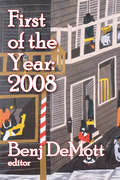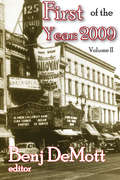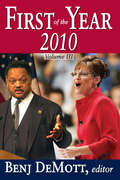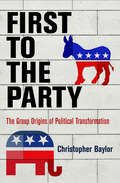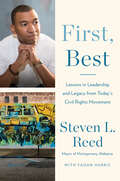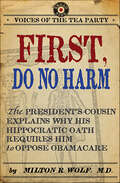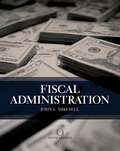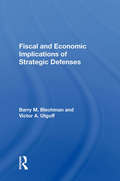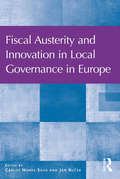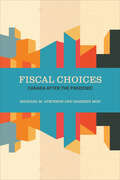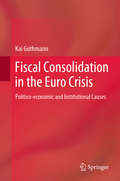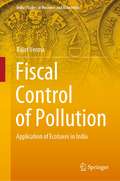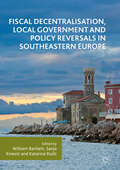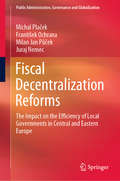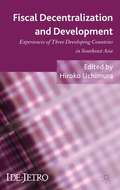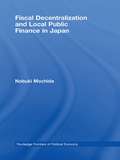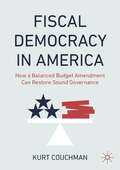- Table View
- List View
First of the Year: Volume I
by Benj DeMottThis is the first in a continuing series of reminders that the past informs the present as it infuses the future. As Benj DeMott notes, the aim of First of the Year is to define "the democratic imperatives and demotic tones that make our ongoing politics of culture matter." This annual publication is grounded in the needs of "dissed" people: disenfranchised, disadvantaged, disinherited, discomfited, and dismissed. But the concept has been sharpened to acknowledge that though the underdog is owed sympathy, the mad dog is owed a bullet. In short, First of the Year is very much an effort of the twenty-first century.The publication aims to be more than a launching pad for writers. It attempts to bridge the gap between radical perspectives without losing focus on the centrality of African-American culture to the national conversation. The coming together of figures like Armond White, Kate Millett, Lorenzo Thomas, Russell Jacoby, Adolph Reed, and Amiri Baraka is quite unlike what can be found in standard literary and social publications. They treat the African-American condition as a policy issue or an executive summary report--not as a touchstone for the state of the nation as a whole.The initial volume also deals extensively and seriously with the issue of humanism and terror, the nature of social movements, electoral and urban politics, and the musical trends of our time. It does so with a sense of urgency often denied in mainstream literary reviews. Issues of "standards" are addressed from the angle of African-American cultural traditions, and the mind-body problem as a matter of race not just of metaphysics. In a nutshell, this volume intends to open a new chapter in the Harlem Renaissance; or better, an American renaissance with a Harlem lilt. First of the Year is an attempt to make political arguments breathe through cultural voices. Contributors include Sheldon Wolin, Jean Bethke Elshtain, Kurt Vonnegut, Paul Berman, Cha
First of the Year: Volume II
by Benj DeMottThis is the second volume in the First of the Year Series. Contributors like Armond White, Philip Levine, Donna Gaines, Lawrence Goodwyn, Irving Louis Horowitz, Charles O'Brien, Fredric Smoler, Paul Berman, and Amiri Baraka are back (and blazing). And there are important new voices in the First mix, such as Vincent Harding, Roxane Johnson, and Bob Levin. If there is a leitmotif to this edition, it is the election and inauguration of Barack Obama as the first African-American president. First aims to be up to the minute of this moment.As Benj DeMott notes "a glance at this volume confirms the margin is still the center for us." And that margin stretches from Harlem to the world. There are tales of edgy sojourns in Afghanistan, Thailand, and South Africa. The volume also has a Question & Answer with Ousmane Sembi, who taught Africans to resist "elements of received culture-those fixed rules and values which nobody but those on the margins dare to question." A second interview with Adam Hochschild celebrates the Englishman who invented abolition, and an African-American original who coined the phrase "crimes against humanity."The volume includes a protest against the Israeli war machine by Uri Avnery who has long been a creative outsider in his own society. It makes the case that American ideologues (on both extremes) keep getting the Middle East wrong because they cannot grasp the complexities of any country, including their own. First of the Year's minority angles of vision will help readers see with new eyes. It will help their hearing too. The volume has plenty of music writing marked by loving attention to details of pop performances. In short, this collection reflects its editor; direct, unafraid, urban, and entirely contemporary.
First of the Year: Volume III
by Benj DeMottThis is the third volume of the First of the Year annual series. Contributors such as Armond White, Philip Levine, Charles O'Brien, Uri Avnery, Donna Gaines, Tom Smucker, Scott Spencer, and Amiri Baraka are back (and fractious as ever). And First's family of writers keeps growing. This volume includes vital new voices such as A. B. Spellman, Bernard Avishai, Rudolph Wurlitzer, and Diane di Prima.First never shies away from hot button issues Fredric Smoler, for example, offers a definitive consideration of America's recent history with torture. But First's approach to current political firestorms is often marked by a cool sense of the past. History is always in the mix when First writers examine the roots of Glenn Beck and Sarah Palin and contemporary right-wing pundits who falsely claim the mantle of Whittaker Chambers. First's refusal to toe "correct" lines is apparent in Benj DeMott's reconsideration of Chambers' work.The new volume is also marked by its cultivation of radical imaginations. The ideas of the Situationists and Cornelius Castoriadis are revived. A young historian, David Waldstreicher, recovers the radical, useable past in the 60s work of Staughton Lynd. Amiri Baraka evokes the felt quality of Jesse Jackson's 1988 campaign and another poet remembers (in verse) long-forgotten, extreme political acts of American Renaissance poets.A recent review of First of the Year: 2009 used a phrase of Kenneth Burke's "perspective by incongruity" to make sense of the method that shaped it. First is committed to thought-provoking incongruities. Faith that wonder is our best teacher informs this volume. First's music writing provides a high-low soundtrack of surprise. Beyond the section on Michael Jackson, there are serious responses to John Coltrane and Bach, World Saxophone Quartet and Mariah Carey, Sonny Rollins and Willie Mitchell. First's message is in
First to the Party: The Group Origins of Political Transformation (American Governance: Politics, Policy, and Public Law)
by Christopher BaylorThe United States has scores of potential issues and ideologies but only two major political parties. How parties respond to competing demands for their attention is therefore central to American democracy. First to the Party argues that organized groups set party agendas by invading party nominations to support candidates committed to their interests. Where the nominees then go, the parties also go.Using in-depth archival research and interviews with activists, Christopher Baylor applies this proposition to the two most important party transformations of the twentieth century: the Democratic Party's embrace of civil rights in the 1940s and 50s, and the Republican Party's embrace of cultural conservatism in the 1980s. The choices made by the parties in these circumstances were less a response to candidates or general electoral pressures than to activist and group influences on nominations. Party change is ultimately rooted in group change, which in turn is ultimately rooted in the coalitional and organizational challenges confronting groups. Baylor surveys the factors that determine whether a coalition is viable, including issue overlap, the approval of their own members and staff, and the ability to reach new audiences. Whether groups succeed in transforming parties depends largely on choosing the right allies and adjusting accordingly.In moments of profound party change, the prevailing political forces come to light. With its fine-grained analysis of major party change, First to the Party offers new insight into the classic issues confronting parties, representation, and democracy.
First, Best: Lessons in Leadership and Legacy from Today's Civil Rights Movement
by Steven L. Reed Fagan HarrisThe first Black mayor of Montgomery, Alabama, shares his story of making his way in a world that wasn&’t built for him, drawing on his rich heritage as the son of a civil rights leader.As a proud son of a civil rights leader, Steven L. Reed grew up hearing stories about how his father integrated Montgomery lunch counters and took advice directly from Dr. Martin Luther King Jr. and Reverend Ralph Abernathy. However, it wasn&’t until Reed was in the fourth grade and received a death threat against his father that he began to understand more fully the importance of the lessons his father was trying to impart. At this pivotal moment, his father explained, &“My job is to prepare you to be a cross-bearer and not just a crown-wearer. Bigotry has no place in our household. It will only hold you down and make you small.&” First, Best is an essential antidote to the perpetual dehumanization and distortions of Black men in our culture and media. By sharing the story of forging his own path, Reed offers an alternative narrative to Black men coming of age, catalyzing their hope and sense of possibility. Although Reed took a circuitous path to the office of mayor that began by forging his identity at Morehouse College, pursuing entrepreneurship and exploring the wider world, and serving as a probate judge, each step was guided by the values of his father&’s generation. First, Best is not just about assuming the mantle of manhood or leadership, nor is it only about the expectation of greatness. Fundamentally, it&’s about responsibility and preparation, serving others, and being willing to pay the price of leadership by carrying the weight of each decision. First, Best affirms the next generation of Black men and women by showing, through story and example, their power and potential in a world that doesn&’t always root for them.
First, Do Less Harm: Harm Reduction as a Principle of Law and Policy (Health and Society)
by Vanessa Gruben Chelsea CoxReaders will be able to gain a deeper understanding of how different approaches to harm reduction can create a stronger foundation for more effective policies and legislation. Scholars from law and social sciences collaborate with frontline organizations as well as with individuals with lived experience to reflect diverse perspectives, and transform how society addresses substance-related challenges.Each chapter provides unique findings, drawing from examples of harm reduction strategies implemented for opioids, cannabis, and tobacco in Canada and beyond. While harm reduction has been a central aspect of the legal and policy responses to all three substances, its application has varied significantly. First, Do Less Harm explores how the ongoing opioid crisis emphasizes the pressing need for safe consumption sites and life-saving tools like naloxone. Case studies on Canada’s legalization of cannabis highlight both the benefits and challenges of providing legal and regulated access to a drug. The volume further examines the evolving landscape of tobacco regulations where recent innovations such as vaping offer less harmful alternatives, yet raise significant concerns about youth uptake and public health. Designed for policymakers, health professionals, academics, and anyone interested in creating safer communities, this collection not only presents thought-provoking ideas but also provides inspiration to take action.
First, Do No Harm: The President's Cousin Explains Why His Hippocratic Oath Requires Him to Oppose ObamaCare (Voices of the Tea Party)
by Milton R. WolfNew from Broadside Books' Voices of the Tea Party. The discussion what role—if any—the government should play in regulating and dictating the delivery of health care in the United States has become ground zero in the much larger age-old struggle between statism and individual liberty. Personifying this struggle is the conflict between the big government schemes of President Barack Obama and the free market principles of the President's own cousin, the private practice physician Milton R. Wolf, M.D. When Barack Obama and Dr. Milton Wolf met for the first time in May 2010, it marked the beginning of a new phase in this all-American family feud. In this work, Dr. Wolf takes the gloves off and describes the results of decades of government intervention in health care, the disastrous doubling down on failure of ObamaCare and finally the alternative free market reforms that will save our system and ultimately our nation.
First: Sandra Day O'Connor
by Evan ThomasThe intimate, inspiring, and authoritative biography of Sandra Day O’Connor, America’s first female Supreme Court justice, drawing on exclusive interviews and first-time access to Justice O’Connor’s archives—by the New York Times bestselling author Evan Thomas. <P><P>She was born in 1930 in El Paso and grew up on a cattle ranch in Arizona. At a time when women were expected to be homemakers, she set her sights on Stanford University. When she graduated near the top of her law school class in 1952, no firm would even interview her. But Sandra Day O’Connor’s story is that of a woman who repeatedly shattered glass ceilings—doing so with a blend of grace, wisdom, humor, understatement, and cowgirl toughness. <P><P>She became the first ever female majority leader of a state senate. As a judge on the Arizona Court of Appeals, she stood up to corrupt lawyers and humanized the law. When she arrived at the United States Supreme Court, appointed by President Ronald Reagan in 1981, she began a quarter-century tenure on the Court, hearing cases that ultimately shaped American law. <P><P>Diagnosed with cancer at fifty-eight, and caring for a husband with Alzheimer’s, O’Connor endured every difficulty with grit and poise. Women and men who want to be leaders and be first in their own lives—who want to learn when to walk away and when to stand their ground—will be inspired by O’Connor’s example. This is a remarkably vivid and personal portrait of a woman who loved her family, who believed in serving her country, and who, when she became the most powerful woman in America, built a bridge forward for all women. <P><b>A New York Times Bestseller</b>
Fiscal Adjustment for Stability and Growth
by James DanielA report from the International Monetary Fund.
Fiscal Adjustment in Sudan Size, Speed, and Composition
by Kenji Moriyama S. M. Ali Abbas Abdul NaseerA report from the International Monetary Fund.
Fiscal Administration Analysis and Applications for the Public Sector
by John L. MikesellEver wonder how federal finance really works? FISCAL ADMINISTRATION, Ninth Edition, shows you how public budgets operate and gives you the opportunity to crunch the numbers. With actual data from the U. S. federal budget, including its breakdown, you can see for yourself how policymakers allocate money. Each chapter illustrates concepts and issues with case studies from the private sector as well as from public finance.
Fiscal And Economic Implications Of Strategic Defenses
by Barry M BlechmanEstimates of the potential costs of alternative strategic defense systems should be an intrinsic element in decisions about whether the US should develop and deploy these systems, especially because of the ''opportunity costs' 'involved-what the nation would have to forgo in other military or civilian programs or in private resources because of higher taxes or larger deficits. In this book, the authors describe four notional strategic defense systems, each with a different ambitious objective, and then estimate their costs
Fiscal Austerity and Innovation in Local Governance in Europe
by Carlos Nunes Silva Ján Bu?ekFollowing the financial crisis and subsequent impacts of economic slowdown and austerity, the emergence of new local governance models and innovation is a very timely issue. The same goes for identifying new types of funding schemes and fiscal models prompted by austerity with the reduction in financial resources for local governments. This book offers a broad perspective on some of the organizational and financial problems faced by cities and local governments across Europe and analyses the reactions and reforms implemented to address current economic and public finance conditions. The geographical coverage of the case studies, multidisciplinary background of the contributing authors and focus on a multiplicity of issues and challenges that confront local governments, not just financial issues as is often the case, means this book is relevant to a wide readership. The book is written for post-graduate students, advanced undergraduates, and researchers in the multidisciplinary field of local government studies (Public Administration, Geography, Political Science, Law, Economy and Sociology), as well as practitioners working in local government institutions.
Fiscal Choices: Canada after the Pandemic (The Johnson-Shoyama Series on Public Policy)
by Michael M. Atkinson Haizhen MouThe COVID-19 pandemic revealed that governments can quickly respond to a fiscal crisis without becoming mired in unproductive wrangling. But the pandemic has also revealed the limits of traditional policy instruments in stabilizing the economy, controlling inflation, and fostering economic growth. Fiscal Choices sheds light on the economic dimensions of COVID-19 and examines the state of Canada’s fiscal policy and fiscal health following the pandemic. The book covers a cluster of key fiscal policy topics: the overall capacity of government, the growth of inequalities, the management of sovereign debt, and the troubled institutions of federalism and parliamentary government. The book draws upon candid, in-depth interviews with over 70 former and current politicians, public servants, and academic experts who aim to establish a sustainable future within an accountable political system. The book argues that although those who are entrusted with the instruments of power are intelligent and well meaning, they are reluctant to take risks or abandon well-known, if poorly performing, formulas. It concludes with a set of predictions and prescriptions rooted in a realistic interpretation of Canada’s political economy. Ultimately, Fiscal Choices presents a sober assessment of federalism and parliamentary government as instruments of democratic accountability.
Fiscal Consolidation in the Euro Crisis: Politico-economic and Institutional Causes
by Kai GuthmannThis book sheds new light on if and why, between 2009 and 2015, European governments succeeded or failed in initiating and actually realizing some of the farthest-reaching austerity plans in modern history. The author analyzes the economic and political context and the underlying causes of austerity and economic adjustment packages during the Euro crisis. In doing so, he shows that austerity has its roots in an institutional mismatch between capitalist diversity in the Eurozone on the one hand, and an ill-conceived common economic regime on the other. In this context, austerity trumped politics, and even democracy itself. The book will appeal to scholars of political science and comparative political economy, as well as governmental policymakers and practitioners in the finance sector.
Fiscal Control of Pollution: Application of Ecotaxes in India (India Studies in Business and Economics)
by Rajat VermaThis volume analyses the process and structure of ecotaxes in India to bring forth its rationale, application and incidence on emerging environmental problems on the backdrop of the environmental issues confronted by the Indian economy. Being at infant stage in India, the concept of ecotaxes is plagued with large empirical difficulties. This book provides a holistic understanding of the complexities in the design and implementation of these fiscal instruments at the country level. After elaborating on the theory, history of its applications, the book provides an innovative methodological exercise. It examines the adequacy and relevance of ecotaxation in the Indian context, along with ensuring that the distortions due to the proposed levy are minimised. The incidence of these taxes on the households, the double dividend hypothesis and the effect on competitiveness of the producer are a few of the core themes elaborated upon in this book. This is demonstrated through a linear general equilibrium framework of Environmentally extended Social Accounting Matrix (E-SAM).The book provides material for the researchers and graduate students on the methodological structure of eco-taxes. The proposed methodological intervention could be utilised by the researchers who wish to analyse the macroeconomic impact of any tax through the framework of Social Accounting Matrix (SAM). Additionally, the process as well as the implications and nuances provided in the book will assist the policy makers to design innovative policies for dealing with environmental issues. The volume also has something for the practitioners by helping them comprehend various effects of these instruments on different stake holders of the economy and thus will be useful as a policy prescription. The three policy scenarios analysed in this study could be considered by the policymakers while attempting to design these instruments in the Indian context and thus ending the extensive reliance on the age old and grossly ineffective Command and Control (CAC) Policies.
Fiscal Coverage in the Countries of the Middle East and Central Asia: Current Situation and a Way Forward
by Daria ZakharovaA report from the International Monetary Fund.
Fiscal Cycles in the Caribbean
by Juliana Dutra AraujoA report from the International Monetary Fund.
Fiscal Decentralisation, Local Government and Policy Reversals in Southeastern Europe
by William Bartlett Sanja Kmezić Katarina ĐulićThis edited collection provides a comprehensive geographic and chronological overview of the decentralisation processes in the successor states of former Yugoslavia and Albania during their transition and EU integration years, from 1990 until 2016. These countries present a unique laboratory for the analysis of economic, social and political change, having traversed armed conflicts, dramatic economic and political changes, and EU pre-accession processes involving deep institutional reform. They have also endured the Eurozone crisis, which has led to high levels of unemployment, wide fiscal gaps and dangerously high levels of indebtedness. Observing the quarter century-long transition from socialism to capitalism through the prism of decentralisation sheds new light on studying the political economy of the region and the current status of the individual countries in terms of economic development and their EU integration progress. The contributors enrich the wider literature on fiscal decentralisation in transition countries by exploring several broad questions on democratisation, the political economy of post-communist transition, the role of external actors in policy transfer and the issue of financial stability in the post-crisis period.
Fiscal Decentralization Reforms: The Impact on the Efficiency of Local Governments in Central and Eastern Europe (Public Administration, Governance and Globalization #19)
by Juraj Nemec Michal Plaček František Ochrana Milan Jan PůčekThis book examines the impacts of fiscal decentralization reforms on the efficiency of local governments in Central and Eastern European (CEE) countries. By offering a comparative perspective and by applying econometric methods and regression models, it analyses various reform trajectories and their effects on individual CEE countries. Furthermore, the book discusses input and output indicators for evaluating the efficiency of municipalities. Readers will learn about the common features of these countries, the impact of path dependence, and future prospects for decentralization reforms. In closing, the book discusses modern management and administration methods, opportunities for cooperation between municipalities, co-creative service delivery, and other measures that could improve the efficiency of public service provision.
Fiscal Decentralization and Development
by Hiroko UchimuraAn in-depth analysis of the fundamental role that decentralization plays in developing countries, using detailed statistical data to examine the actual fiscal structure between tiers of government, and the effects of decentralization at the local, national and international levels.
Fiscal Decentralization and Local Public Finance in Japan (Routledge Frontiers Of Political Economy Ser. #Vol. 107)
by Nobuki MochidaThe intergovernmental fiscal issue is highly relevant given the worldwide movement toward more decentralized governance in both industrial and developing countries. Over the course of five decades Japan has developed a robust system of decentralized governance. This book investigates fiscal decentralization and local finance in Japan wi
Fiscal Democracy in America: How a Balanced Budget Amendment Can Restore Sound Governance
by Kurt CouchmanThis book explores the U.S. federal government&’s need for binding budget targets to recover fiscal sustainability and boost economic growth. It details the flaws in past balanced budget amendment proposals, outlines the features of a promising new approach with broad appeal, and how the amendment might be adopted and implemented in today's political climate. Even as the U.S. economy expands, the federal government continues to run large and growing budget deficits that exceed $2 trillion per year and a debt burden eclipsing annual economic output. With debt pressures continuing to grow, Congress is almost certain to return to considering a constitutional amendment to bring the federal government&’s spending and revenue into balance. Congress has attempted to pass BBAs in the past, but none have succeeded despite their proliferation among advanced economies. In Fiscal Democracy in America, Kurt Couchman argues for a principles-based balanced budget amendment (BBA) that would let Congress phase out the gap between revenue and non-interest spending over a 10-year period to restore fiscal space for emergencies while encouraging Congress to overhaul the dysfunctional federal budget process. Couchman explores America's financial history, the dangers of high and rising debt burdens, and examples of other countries, state governments, and the U.S. federal government itself moving toward healthier budgeting practices. He particularly seeks to lay out neutral, predictable rules for sound governance so that members of Congress can holistically and responsibly manage federal spending and tax policies to provide ever-greater value for the American people. Aimed at policymakers and the public across the political spectrum, Couchman's proposals would guide America toward a more prosperous and democratic future.
Fiscal Dimensions of Sustainable Development
by Sanjeev Gupta Kevin Fletcher Michael Keen Benedict Clements Luiz De Mello Muthukumara ManiA report from the International Monetary Fund.
Fiscal Federalism
by Robin Boadway Anwar ShahThis book provides a comprehensive account of the principles and practices of fiscal federalism based on the currently accepted theoretical framework and best practices. The traditional topics of assignment of responsibilities, intergovernmental fiscal arrangements, fiscal competition, and grants are covered in a unified framework with reference to actual practices followed in federations around the world. Special issues such as local government and the implications of natural resource issues are considered along with emerging issues such as governance, corruption, and the effect of globalization and the information revolution on the nation state. The treatment is non-technical and suitable for a wide variety of audiences, including scholars, instructors, students, policy advisors, and practitioners.
